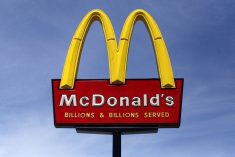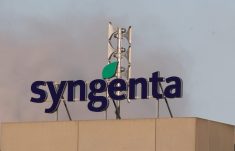New York/Chicago | Reuters — U.S.-based Monsanto sweetened its offer to buy Switzerland’s Syngenta, valuing the company at around US$47 billion as it tries to lure the Swiss firm to the negotiating table, a person familiar with the matter said on Monday.
Monsanto, which wants to combine its world-leading seeds business with Syngenta’s own seeds and pesticides, raised its offer to 470 Swiss francs (C$663) per share, from 449, the person said.
The increased offer, which sent Syngenta’s shares jumping, is aimed at ending the stalemate between the two firms. Syngenta rejected a previous proposal in April and has refused to open its books to its rival.
Read Also

U.S. grains: Chicago soybeans dip in choppy trading as Greenland dispute and global supply weigh
Chicago | Reuters – Chicago corn and soybeans slipped in choppy trading on Tuesday as tensions between Washington and Europe…
Monsanto’s sweetened offer is primarily comprised of an increase to the cash portion of its cash and stock proposal, the person added.
Some top investors had been pushing Syngenta to at least sit down with Monsanto and seek a better offer. Cedric Lecamp, senior investment manager at Pictet Asset Management, the 17th-biggest investor in Syngenta, told Reuters earlier this year he thought a deal could get done above 500 francs.
A Sanford C. Bernstein survey earlier this month of nearly 100 current and former Syngenta investors found that about 92 per cent were in favour of a negotiated deal, and would accept a five per cent higher offer from Monsanto. The average acceptable offer price among the investors was 473 francs, according to the report.
The new offer also includes an increase in the break-up fee to US$3 billion from $2 billion if the transaction is blocked by regulators or falls apart for other reasons, the person said.
The offer is not necessarily Monsanto’s best and final bid, and the door could be open to negotiations if Syngenta engages, according to the person familiar with the matter.
A representative for Syngenta, the world’s largest maker of farming pesticides, told Reuters on Monday, “There is no comment to make.” A spokeswoman for Monsanto, the world’s leading seed company, declined to comment.
The increased offer was first reported by Bloomberg on Monday.
Sparring
The value of Monsanto’s share and cash offer has been challenged by a souring U.S. agricultural economy and the recent ructions in the global financial markets.
Its stock price has fallen nearly 20 per cent in the past three months, as grain prices remain soft and U.S. grain exports are hampered by a strong dollar. Its market capitalization is now about US$45.6 billion.
Syngenta’s U.S. listed shares jumped 10 per cent on Monday after closing in Zurich at 357.6 francs a share, putting the company’s market value at roughly US$35.5 billion.
While Monsanto has so far ruled out taking its bid hostile, sparring between the two companies has become increasingly tense with both launching websites promoting their cause and executives from each meeting investors.
Monsanto, which courted Syngenta twice previously without success, has argued the deal will make both firms more efficient by developing seeds and pesticides in tandem and integrating sales and distribution strategies for the two product categories.
Syngenta has argued the deal faces tough regulatory hurdles that Monsanto has not addressed and that the offer undervalues the company.
“We said no in 2011, we said no in 2012, we said no in 2015. What part of no don’t they understand?” CEO Michael Mack told a press conference in July at the group’s Basel, Switzerland headquarters.
Monsanto has promised to sell off Syngenta’s overlapping seed and chemical assets if it wins control of the Swiss company. But the deal could still face regulatory challenges in the U.S., Brazil, China and elsewhere, creating hurdles that could delay or force major concessions to the deal, should it go forward.
— Reporting for Reuters by Mike Stone in New York and P.J. Huffstutter in Chicago. Additional reporting for Reuters by Simon Jessop in London.















